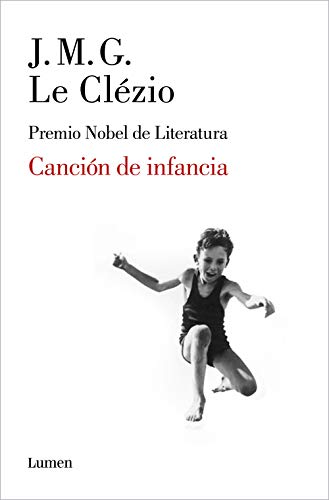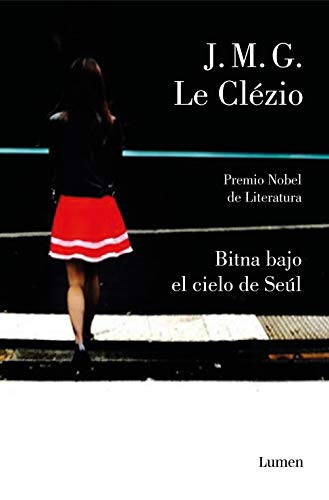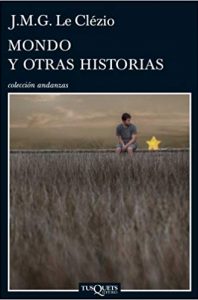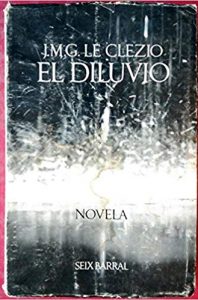The French language has been exerting a special attraction since the XNUMXth century in various authors who explored in their musicality a lyrical addition that infects any prose or that ends up extolling all poetic works. Perhaps the issue lies in Dumas or in Victor Hugo, with that ability to address romanticism in novels as long as they are finally intense. The point is that when authors like Milan Kundera they are also passed into French, it is because the formal effect is there, latent.
All this in relation to another of the great French storytellers who extends his work from the XNUMXth century to the present day. A Jean Marie Le Clezio who uses his suggestive mother tongue to explore and investigate language and its formal intricacies in search of intensity, symbols, deep metaphors, tools with which to present unforgettable stories.
In this mission, almost disturbing for a creator, to redirect inspiration towards the exploration of language at the service of emotions and ideals, Clézio has been able to publish dozens of books since he launched into writing in his early twenties.
What has arrived in Spain is undoubtedly the best of his narrative production. And it never hurts to cultivate with a writer who makes pretentious the most beautiful form of intellectual recreation. Sophisticated readings that lower their intensity as we approach his latest novels.
Top 3 recommended books by Le Clézio
Childhood song
Authors like Le Clézio are unnerving for many other authors who have to opt for the essay, the biography or the novel when they start to write. Because Le Clézio novels his life while doing the almost poetic soliloquy essay and distills those biographical aspects that serve as the essence of immortality, like childhood grounds, of loves and absences that are much more than what they can suppose for other mortals.
So welcome is this new stamp of life made novelistic evocations (described as it sounds with the sophistication of a five-star menu but it is that way). And let's stretch out from the more battle literature to peek into the souls who tell other things that they write in other much more relevant books, those that should surely be rescued in the event of a catastrophe of our civilization ...
After the lullabies come the childhood songs in which we already know how to recite the refrains. And like everything that is learned by heart, those old songs remain forever in the repertoire we seek when there is no other music to whistle to keep up with the wind that carries us.
On this sentimental journey through Brittany, the idyllic land of his childhood, Le Clézio invites us to reflect on territorial identity, nationalisms and the passage of time. From his first memory #the explosion of a bomb in the garden of his grandmother's house, through the years lived as a child of war, which so terribly impacted his learning of the world, the Nobel Prize in Literature draws a Essential page of its emotional geography that speaks of belonging and its place in memory.
A journey towards maturity, but above all a lucid look at the socio-political changes in a single territory, the progressive disappearance of its traditional economy and the proud dignity of a people that, despite everything, clings to its roots.
The music of hunger
With the nature of a Le Clézio composed of emigration, dreams and families broken by war, this novel is understood as a story partly autobiographical or at least inspired by his own family.
Mauritius is a space of evocations and roots, of emigration and destinies for the author and that is where this novel begins, which looks at the idea of the fragility of the prosperous in the human being, of the easy defeat overcame by temptation. of perdition or by the threat of a world close to hecatomb.
Little Ethel Brun would never imagine what it would be like to starve. Sheltered by a powerful but wasteful father but really cared for by her grandfather, Ethel opens up to the world of pre-war Paris.
The girl's instinct leads her to the idea that the good, or at least the comfortable, is nearing its end. And perhaps only she is prepared for the awakening to misery.
Bitna under the Seoul sky
Life is a mystery composed of scraps of memory and ghostly projections of a future whose sole background is the end of everything. Jean-Marie Le Clézio is a portraitist of that life concentrated in his characters determined to unravel everything from a fiction in which any approach is possible, encompassing a composition of basic, everyday concepts, about that character who awaits answers on the other side of the mirror. when we are absorbed in looking at our reflection.
For the occasion of this Bitna novel under the Seoul sky, We glimpse the particular world of a young Bitna who arrived in the great city of Seoul, the capital of the friendly Seoul, condescending to our western world, but ultimately twinned with the north of the same wayward and threatening country. The trip to the capital is not an easy transit. She is a niece added to the trip for the rest of a family united by her direct consanguinity and for which Bitna can only assume the condition of servitude.
Young but determined. Bitna does not agree with her aunt's determining factors and carves out that uncertain destiny for a woman who is almost a child in a city capable of corrupting everything, from power to youth. Luckily Bitna finds Cho, the old bookseller who welcomes her for the particular task of reviving Salomé, a girl who only in the company of someone still young can once again feel that there is life from her most cruel physical limitations.
Soon Salomé discovers that with Bitna and her stories she can leave her own body and walk, run, even love other people who live with her in new worlds never imagined. The triangle between Bitna, Salomé and Cho closes a magnetic space between its vertices. Each of the characters show us a vision of the world from the pain, the shortcomings, the need and the drive to survive despite everything.
With a cadence in tune with the oriental, the enigmatic future of the three characters is presented to us as a mystery that moves between the fictional settings shared by the girls to the wishes of a transforming reality that could heal the wounded heart of the Mr. Cho, longing for his family, located in that north of a country that has become the last great victim of the Second World War that still separates souls today.
The great complications or political derivatives compose contradictions, metaphors, allegories of estrangement and alienation. the Nobel Le Clézio addresses these extremes played in the narrative with a simple and dynamic language at the same time that it awakens deep human concerns.
Other recommended books by Le Clezio…
Mondo and other stories
It is always interesting to discover the great storyteller in the field of the brief, in that kind of synthesis of the creative. While it is true that the always successful detail of a writer like Le Clézio serves the cause of the brief perfectly. Furthermore, in a surprising book that acquires a disruptive nostalgic point around childhood, brevity composes a final tear or a smile, always a critique of the legacy of adults and, of course, an invitation to reflect on the abominable world at the same time. that we invite with formalities and customs to some pure beings such as children, as children were.
The imagination of the little ones unfolds in eight stories of contrasts between the child's eyes, his truth, and the adult gaze on so many censorious and cruel occasions, already knowing that the important thing is the artifice built on the beauty of the world.
The flood
Never a better title for a novel that begins sparkling and ends up flooding the soul with that transcendent literature. The character of François Besson far exceeds the notes of unreality of Gregorio Samsa, at times he approaches a Jean-Baptiste Grenouille intoxicated by the perfume of an instant that transforms the world forever.
A novel with those lyrical sparkles that surely overflow the imagination narrated in its original French but that also in Spanish transform prose into a delicacy for the intellect.
From the moment in which François lives a peculiar scene with a young woman who enraptures his senses and who leads him through a labyrinth for several more days, towards the most complete void or the most exuberant space of liberation. A harrowing vital drift of a character whose will seems to have escaped from his body.





